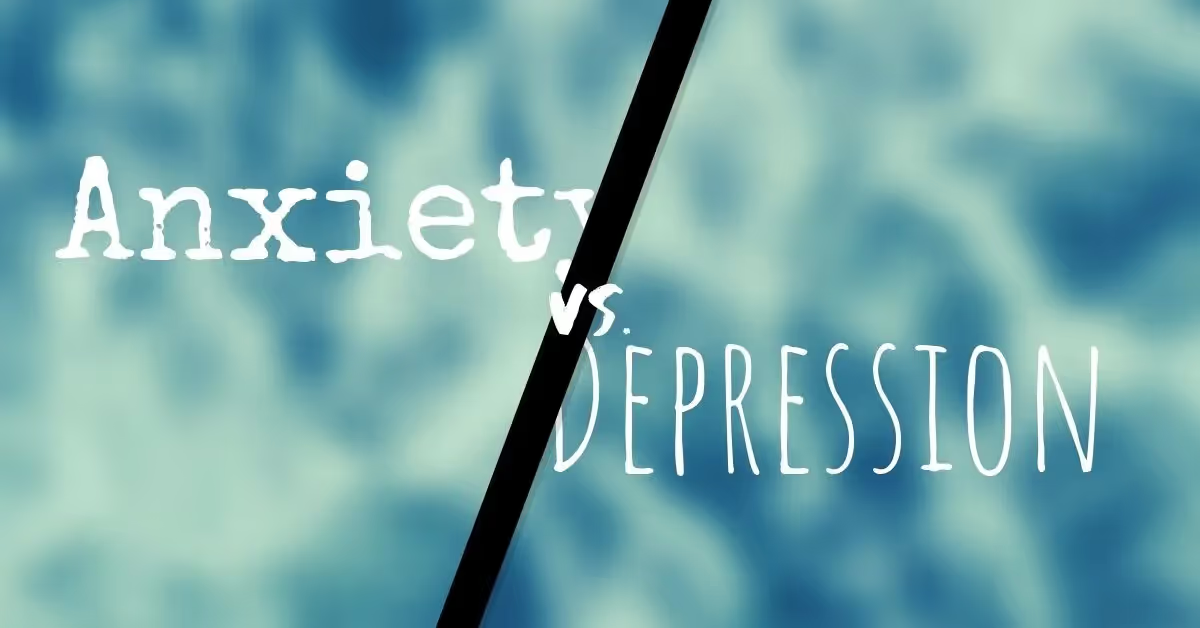Anxiety and depression are two of the most common mental health disorders out there. While some disorders, such as schizophrenia and bipolar disorder, are...

Anxiety and depression are two of the most common mental health disorders out there. While some disorders, such as schizophrenia and bipolar disorder, are relatively uncommon amongst the general population, anxiety and depression are more the rule rather than the exception, with an estimated 15-20% of the general population experiencing one or the other at any given time.
Despite their prevalence, anxiety and depression are often misunderstood, and only a fraction of those who struggle with these disorders seek treatment for them. Additionally, symptoms of the two are often confused, leading to delayed diagnosis and ineffective treatments. Several symptoms of each disorder overlap, which only serves to further confuse the matter, and in some cases, patients may have both disorders at once. Because of this, it is important to understand the differences between these two common, yet troubling disorders.
The key difference between anxiety and depression is the way it presents in the behavior of an individual with either disorder. Anxiety, generally speaking, is characterized by excessive fears or worries about something that is out of proportion to the actual issue itself. Those with anxiety disorders may find themselves worrying excessively about their health, relationships, job performance, or finances. These fears cause them significant stress and are often accompanied by "rumination", otherwise known as "overthinking".
Depression, on the other hand, is primarily characterized by a loss of interest in life and a sense of hopelessness. Those with depression often find themselves losing interest in things that once gave them joy, and may withdraw from everyday life due to apathy or a lack of interest. They often have a bleak outlook on the future, and feel as if they will never get better. Whereas anxiety is primarily concerned with excessive worry, depression is primarily concerned with feelings of apathy, guilt, and hopelessness.

All of us feel anxious sometimes, and anxiety is a normal part of life. Anxiety runs on a continuum from everyday stress to the heightened
Both anxiety and depression are treated with a combination of talk therapy and medication. Some individuals may opt to do one or the other, although several large studies on the issue have found that a combination of both talk therapy and medication to be the treatment course with the highest remission rates, on average.
Despite their name, antidepressants, are often the first-line treatment for both anxiety and depression. Given that many symptoms of both anxiety and depression overlap, researchers have found that certain medications can be effective at treating both conditions.
As with somatic symptoms, those with both anxiety and depression often experience disturbances in their sleep. Those with anxiety may find it extremely difficult to fall asleep at night, feeling as if they can't "shut off" their mind. Depression, meanwhile, is typically associated with excessive sleepiness, or hypersomnia.
Those with depression may feel fatigued no matter how much sleep they get, and this fatigue can greatly impact their ability to function in day to day life. Conversely, those with depression may likewise experience insomnia as well. Waking up much earlier than usual is a common symptom of depression. In both anxiety and depression, changes to an individual's circadian rhythm are common, and often a big obstacle to recovery.
Both anxiety and depression are treated with a combination of talk therapy and medication. Some individuals may opt to do one or the other, although several large studies on the issue have found that a combination of both talk therapy and medication to be the treatment course with the highest remission rates, on average.
Despite their name, antidepressants, are often the first-line treatment for both anxiety and depression. Given that many symptoms of both anxiety and depression overlap, researchers have found that certain medications can be effective at treating both conditions.
Some medications, however, are not ideal for treating anxiety. It's imperative that you consult with your doctor about the best form of treatment.
Anxiety and depression are often thought to be "two sides of the same coin", and thus, have many similar biological features. Regardless, each respective disorder affects different parts of the brain in different ways.
Anxiety typically involves a part of the brain known as the "amygdala", which is responsible for threat detection and the processing of emotions, while depression is typically associated with a decrease in the brain's gray matter, and usually involves a dysfunction of the parts of the brain associated with the ability to feel pleasure
Both anxiety and depression are umbrella terms that often host a number of different, yet related disorders. Anxiety disorders, for example, include obsessive-compulsive disorder, post-traumatic stress disorder, and panic disorder, among others. All of these have differing symptoms that involve the way in which the brain processes threats and feelings of fear. Depression, on the other hand, can likewise manifest itself in a variety of different ways, such as with bipolar disorder, dysthymia, and psychotic depression.
Despite their similarities, those with anxiety or depression may find different ways in which to cope with their disorders, given the distinct nature of each. Those with depression, for example, often withdraw from the responsibilities from daily life. They may avoid social interactions, and often sleep excessively as a way of dealing with their symptoms.
Those with anxiety, on the other hand, may find themselves working excessively in an attempt to regain a feeling of control over their lives. The difference in coping mechanisms relates to the general effect that each disorder has on an individual-- anxiety tends to be an "activating" disorder, causing patients to frantically do more in an attempt to gain their bearings, while depression tends to be more subdued, greatly impairing an individual's ability to become motivated and get things done.
Both anxiety and depression manifest themselves in behavioral changes in the individual who experiences them. Irritability is a common symptom in both, along with disruptions in appetite and sleep. Anxiety, however, may result in dissociative symptoms, such as derealization and depersonalization, that aren't necessarily prevalent in depression. Those with anxiety often feel that they are "going crazy" or becoming disconnected with reality. With anxiety alone, however, this is never the case.
Depression, meanwhile, may occasionally be associated with psychotic symptoms. Those with certain types of depression may find themselves hallucinating and breaking from reality. Although this is fairly rare, it does happen, and is one factor that makes depression distinct from anxiety.
Both depression and anxiety are fairly common disorders, and among the most frequent of psychiatric complaints. Anxiety is somewhat more common than depression, with approximately 40 million Americans struggling with a diagnosable anxiety disorder at any given time, versus roughly 20 million for depression.
Both anxiety and depression appear to be more common in women than men, although this may be due to the increased likelihood of women seeking out treatment. Both anxiety and depression are on the rise in both the United States and worldwide.
Anxiety and depression are both highly treatable disorders, despite the enormous health consequences associated with both conditions. While once considered to be a shameful secret, our understanding of both conditions has improved dramatically in the last century. Therapy has been shown to be enormously beneficial in the treatment of depression and anxiety, and most people who seek treatment for these conditions are able to recover to the point where their symptoms are in remission.
While anxiety and depression are treatable, both are chronic conditions which may result in flare-ups over the course of an individual's life. Vigilance, along with self-care, are crucial to the management of both conditions.
Yes, Medicaid provides insurance coverage for therapy services specifically designed to help individuals struggling with anxiety, depression, and other mental health conditions.
It's important that you feel comfortable discussing personal matters with your therapist in order to open up and get more out of therapy sessions; therefore finding someone who meets certain criteria like experience level, expertise areas, and personality is key when selecting a therapist who can give meaningful feedback about how best handle issues related to anxiety or other mental health concerns.
Ignoring anxiety can exacerbate symptoms and make it more challenging to manage over time. This can result in a negative impact on your personal, professional, and social life, leading to feelings of isolation and even depression.
The duration of anxiety counseling varies for each individual, depending on the severity of their anxiety and their progress in therapy. Our therapists will regularly assess your progress and adjust your treatment plan as needed.
Other activities which have been found helpful in reducing both immediate feelings of anxiousness and long-term anxieties associated with chronic disorders include yoga, journaling, nature walks, art therapy, volunteering, and other low-stress activities. Additionally, developing a healthy lifestyle incorporating adequate sleep, physical activity, and nutritious meals can help reduce overall stress levels.
Addressing anxiety is crucial because it can significantly impact your quality of life and overall well-being. Left untreated, anxiety can lead to more severe mental health issues, relationship problems, and difficulty functioning in daily life.